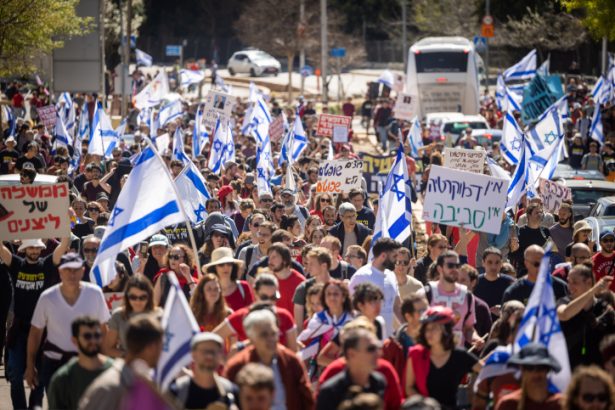Judicial reform is necessary, but if there is no compromise on its character the full measure of damage may be beyond reckoning, argues Donna Robinson Divine.
The announcement that Israel’s fifth election in the past three a half years would take place on 1 November 2022 made me stop in wonder for a moment. Why not hold the election one day later to coincide with the fateful date when Sir Arthur Balfour sent word to Lord Rothschild ‘that Great Britain would look with favor on the establishment of a Jewish National Home in Palestine’, setting the course for Israel’s founding in 1948? An election on 2 November might have had deep historical resonance had the ballots returning Benjamin Netanyahu to the office of prime minister not been compromised by a legislative agenda deeply at odds with what we know unfolded after that consequential letter was mailed. For a coalition determined to steamroll in radical changes to the judiciary has essentially thrown Zionism’s foundational principles into doubt.
Described by its backers as simply rebalancing core state institutions, opponents have denounced the proposed changes as a coup and prelude to dictatorship. How did a political arena managing intense struggles over power and resources for 75 years descend so quickly, even fracturing the very language that could form the basis for a reasonable compromise? That Benjamin Netanyahu, a politician with a record in strengthening Israel’s economy based on cutting edge technology and high growth to ensure security within and without the country now backs policies threatening to squander these achievements is more than ironic. It is as if he is repudiating the policies he once embraced for governance, embracing strategies he once repudiated.
The massive protests and warnings about the proposed reforms invite us to think about how a political system can produce pathologies endangering all its recent successes. Comparing the two dates helps us see the dangers of political polarisation and what happens when the sides back themselves into corners where their views are cast as totally incompatible. For the discourse the reforms have unleashed provides a snapshot of the deep and spreading roots of polarisation—not just over Jewish settlements in the West Bank or over religious and secular domains but rather over the legitimacy of Israel’s state institutions supposedly responsible for how these issues are to be addressed. No less important a question is whether the proposed restructuring of government institutions is consistent with the Zionist project configured at the end of World War I with the defeat of the Ottoman Empire. To grasp why so many Israelis are convinced the plan to restructure the judiciary is an attempt to radically alter Israel’s identity requires a review of the critical forces brought together to create a Jewish state.
Great Britain’s Balfour Declaration and its subsequent mandatory rule provided Palestine with a geography and gave Zionists the opportunity to turn their dreams into reality. It also supplied the Jews with an incentive to consolidate their many groups into comprehensive frameworks that would secure their needs, promote their goals, manage their own affairs –within the limits prescribed by colonial policy – and ultimately, project an image of a polity so stable as to be worthy of sovereignty. But they also triggered problems Zionism had not anticipated and was not fully prepared to resolve. Not even on matters of central importance such as immigration was there a Zionist consensus. While making the idea of ending Jewish exile the premier point of Zionist rhetoric, the Zionist movement’s leadership cooperated with the mandatory administration in trying to balance the flow of people with the circulation of funds.
The UN Partition Resolution and the British decision to end the Palestine Mandate provided no template for state building or for how to ensure support from the global powers whose policies would spell the difference between success and failure. There was no time to develop a pathway, and the people responsible for erecting a state were limited by organisations that were created at a different time and for dramatically different circumstances. The men and women driven by a sense of historic mission to risk everything to protect Jewish lives also had to structure a government, an activity that demanded a different kind of boldness in a context tested not by fire power but by competing interests and goals. Political leaders had to guide the population through a transition as unclear as it was undefined.
Wherever else they turned for models of governance, Israel’s political leaders had to engage the power of organisations founded to create the conditions for statehood that could mobilise significant amounts of capital and had the potential of controlling labor supplies, burdens the state would inevitably have to assume but which it could not be certain at that fateful time of discharging successfully. Institutions that had long resisted attempts by the colonial power to limit their activities before statehood were not easily disposed to having their authority ground down after a state was established. These expectations set in motion contradictory pressures. How these pressures interacted was determined by a series of intense struggles for power affecting not only the structure of government and the understanding of sovereignty in the newly created Jewish state but also a reliance on political parties as legitimising agents for brokering the compromises necessary for policymaking.
There was, of couse, more than one so-called ‘Altalena Moment” in Israel’s War for Independence – for example, when the army was ordered not to try to conquer the West Bank or what was called by many in the military ranks, Judea and Samaria. But the legitimacy of such commands was stapled to party politics where decisions more often than not came wrapped in exalted visions of the hopes for a redemption a Jewish state was expected to one day achieve. It is important to say explicitly, then, that Zionism’s greatest success – the establishment of a state in 1948 – came not from the imaginative potency of its messianic myths but rather from its capacity to set priorities and to adhere to a timetable that had international resonance and produced significant global support. Zionism took up no cover in a Hobbesian sovereign composed of faceless and inert subjects or in the range of agency offered by Locke that could change the form of government by a simple vote. Zionists regarded sovereignty like any other national aim, either as end or means, according to circumstances.
Nor could the country’s most serious domestic problems, immigration and economic development be addressed adequately by either utopian or religious commitments. These pressing needs provided the impetus for developing a new language of state-building. The word deployed was mamlachtiyut – to denote that many of the tasks previously performed by the leading nation-building institutions must now be performed by the state. But mamlachtiyut could never extinguish partisan interests; indeed, it depended on them for its legitimacy. For that reason, a discourse on citizenship emphasising obligations emerged almost entirely obscuring a language of common political rights, even though freedoms associated with speech and protest were generally taken for granted and for the most part, protected.
Obligations were a strategic pillar of citizenship in the newly-born Israel, but they were not expected to devolve upon residents equitably because certain communities like the ultra-Orthodox either denied the Jewish state’s full legitimacy or were, like the Arabs, assumed hostile to its existence. The language of citizenship therefore exempted both groups from many of the most onerous nation-building burdens granting each a great deal of cultural and religious autonomy. Obeying laws and paying taxes would suffice. That Israel’s citizens did not have identical obligations can be read as an indication of the law’s respect for the country’s diversity and the integrity of the communities encompassed within its borders. But such inequities also deprived these groups of the skills and experiences necessary for independent action generating a deep dependence on formal leaders to speak for their interests. This kind of passivity has eroded in recent years as many in these communities have decided they would be better off with integration into Israeli culture and politics – increasing numbers of Arabs are joining the army and more ultra-orthodox are entering the work force. Signs of assimilation have provoked tensons and dissent within both communities opening gaps between traditional leaders and new generations pushing for social change.
No less relevant to this argument is that the country has raised its standard of living and expanded opportunities for new generations – offering lifestyles its Zionist founders never imagined. Even politicians from the most hardline parties whose platforms virtually ignore the demands of Israeli Arabs have forged alliances with local Arab leaders to expand educational prospects, career advancement, and to improve local services.
The Supreme Court
Legitimacy for all these decisions was, for a long time, stitched together through political party deliberations. But as political parties weakened over the years – albeit for different reasons—they began to knit themselves into a power not brokering legitimate compromises but rather into a politics in search of enemies rather than of opponents. The Supreme Court may have intended to step into the breach left by the weakened party system, but without a written constitution, many of its rulings triggered distrust of the judicial system, itself, laying the groundwork for the current proposals and for the sense of their urgency.
It is worthwhile to note that Israel’s justices were once not only divided on how and when to exercise the authority of judicial review; they also questioned whether they possessed the prerogatives of that authority. The 1992 Basic Law on Human Dignity and Liberty provided the conceptual framework for the Court to broaden its protection of individual rights – including the right to private property [not an automatically accepted principle in an Israel initially dominated by socialist discourse] – and to withdraw some issues from the realm of Jewish nation-building to the context of a universal principle accorded to all citizens. This new understanding of the Supreme Court’s interpretive range set in motion the defining struggle over judicial authority. To be sure, there are many different reasons bringing people out to the streets every week. Some parties on the left that have lost their electoral power in recent years perhaps view the protests as a means of undoing the outcome of the recent election.
But that interpretation does not capture the impetus for the rage nor for their daunting scale. A single instance provides a summary of its essence. It was the declaration by reserve pilots who normally volunteer for updated training to discontinue their service if the reforms were carried out. Israelis are out in the streets across the country trying to halt what they believe are attempts to introduce fundamental changes not simply to the balance of government institutions but rather to the very nature of the country.
What the Protestors Fear
For protesters, the very term judicial reform lacquers the government with a gloss hiding the real political agenda of the coalition that Prime Minister Netanyahu cobbled together after the election. The coalition agreement freighted this legislative blitz with the intention to sever Israel’s core public values from the ones the Zionist project embraced in its past. How? Let me count the ways.
First, the proposals offer the ultra-Orthodox expanded stewardship over the range of their religious authority weakening the capacity of secular state institutions, including the Supreme Court, to draw the borders between religious and civil domains or to correct certain obvious inequities in the duties required of all citizens. Second, bestowing responsibility for national security on someone deemed unfit for military service and known more for his incendiary rhetoric than for his administrative capacities or for his policing skills. Third, handing some rather ill-defined power for settlement expansion to a person known for his messianic visions of a Jewish state not only confuses the chain of military command, it also raises the likelihood of violence bringing the country closer to a cultural apocalypse. Fourth, restricting judicial review over military and police actions may also expose the men and women who serve in these units to charges in international courts with hostile views of the Jewish state. Finally, the warnings coming from economists, bankers, tech entrepreneurs, soldiers in prestigious units, commandos who risk their lives in combat are growing because they oppose plundering a Jewish state that still demands so much of them of the core values held sacred even in times when the country faced the possibility of annihilation.
It goes without saying that that if there is a need to recalibrate the scope of judicial authority – and I believe there is – it requires serious debate and careful deliberations with people holding different views. It makes no sense to push legislation that simply substitutes the rage of one sector for the alienation of the other. What a political system, conscious of living with history, requires is not to evade the moment when conventional approaches no longer work but rather to acknowledge the new circumstances and to find ways to maintain the state’s essential values and purposes. Is judicial reform necessary – yes – but only if there is a genuine desire for compromise before the full measure of damage is beyond all reckoning.
Although Israelis pay a high price for their sovereignty, most have continued to be willing to bear the costs – in lives lost and in taxes levied – to sustain a state that embraces modernity: a state that doesn’t try, against all odds, to close itself off from the world or to transfer significant portions of public policymaking away from secular to religious institutions. The faith in the liberating possibilities of national self-determination may have been extinguished in many places, but until the reforms were initiated, there was scant evidence of such political apostasy in Israel. The protests coming from people who have willingly accepted and discharged their obligations as citizen of Israel are simply too resonant to be dismissed or ignored.
The quest for power in the fractured politics evident across the globe is more than a lesson in humility. For it forces an acknowledgement of antimonies too deeply entrenched to reconcile but not so firmly fixed to preclude the practical bargaining and compromise that distributes material benefits rather than seeds fevered narratives. Putting together coalitions not on common cultural ground but rather on agreements over budgetary allocations may offer opportunities for the operations of government, no small achievement for an era marked as much by dysfunction as by discontent. When warring cultures and polarization are recurring metaphors for public life, calls for recognizing the limits in politics may seem quaint but may be the only way to balance competing imperatives. Politics may, in fact, work in practice before it works in theory.





































